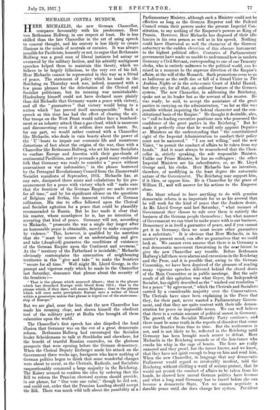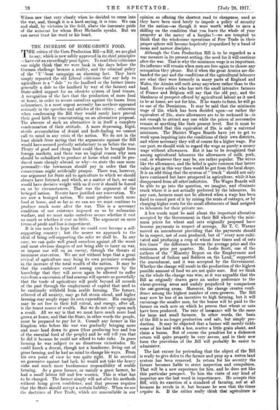MICHAELIS CONTRA MUNDUM.
HERR MICHAELIS, the new German Chancellor, compares favourably with his predecessor, Herr von Bethmann Hollweg, in one respect at least. He is less skilled than the late Chancellor in the art of using speech to conceal thought, and his oratory is less likely to create illusions in the minds of neutrals or enemies. It was always possible for Pacificists, honestly or not, to argue that Bethmann Hollweg was a good man of liberal instincts led astray or overawed by the military faction, and his adroitly ambiguous speeches helped them to maintain this theory, which we believe to be largely fallacious, to the very eve of his fall. Herr Michaelis cannot be represented in this way as a friend of peace. The statement of policy which he made in the Reichstag on Thursday week was, indeed, seasoned with a few pious phrases for the delectation of the Clerical and Socialist politicians, but its meaning was unmistakable. Hindenburg himself could not have declared more plainly than did Michaelis that Germany wants a peace with victory, and all the "guarantees" that victory would bring to a nation which "has proved itself unconquerable." Such a speech at this time has had the effect of clearing the air. Our troops on the West Front would rather face a bombard- ment or an infantry attack than a gas-cloud, which is nauseous and disconcerting even if it seldom does much harm. So, for our part, we would rather contend with a Chancellor like Michaelis, who deals in vain boasts about the power of the U '-boats to impair our economic life and monstrous distortions of fact about the origins of the war, than with a Chancellor like Bethmann Hollweg, who set his tame Socialists to confuse Europe and America with their gas-clouds of sentimental Paciflasm, and to persuade a good many credulous folk that Germany was ready to consider a "peace without annexations or war indemnities," in the phrase borrowed by the Petrograd Revolutionary Council from the Zinimerwald Socialist manifesto of September, 1915. Michaelis has, at any rate, dissipated those mists and exhalations by his pro- nouncement for a peace with victory which will "make sure that the frontiers of the German Empire are made secure for all time," and by his significant silence on the questions of Belgium and Serbia, the innocent victims of German militarism. His rise to office followed upon the Clerical and Socialist agitation for a peace that could be ,plausibly recommended to Russia. But he has made it clear that his master, whose mouthpiece he is, has no intention of accepting that kind of peace. Germany will not, according to Michaelis, "prosecute the war a single day longer after an honourable peace is obtainable, merely to make conquests by violence." This, however, is qualified by the assertion that she "must by means of an understanding and give and take (Ausgleieh) guarantee the conditions of existence of the German Empire upon the Continent and overseas." As the "territory of the Fatherland is inviolable," Michaelis obviously contemplates the annexation of neighbouring territories in this" give and take" to make the frontiers "secure for all time., ' Well might Mr. Lloyd George, in the prompt and vigorous reply which he made to the Chancellor last Saturday, denounce that phrase about the security of the frontiers :— " That is the phrase which annexed Alsace; that is the phrase which haii drenched Europe with blood from 1913; that is the phrase which, if they dare, will annex Belgium ; that is the phrase which will once more precipitate Europe into a welter of blood within a generation unless that phrase is wiped out of the statesman- ship of Europe."
But we are glad, none the less, that the new Chancellor has made his meaning clear, and shown himself the obedient tool of the military party at Berlin who brought all these calamities upon the world.
The Chancellor's first speech has also dispelled the fond illusion that Germany was on the eve of a great democratic reform. Bethmann Hollweg had encouraged the Socialist leader Scheidemann to talk at Stockholm and elsewhere,. for the benefit of trustful Russian comrades, on the glorious prospects that were opening before the German democracy. When the Clerical Deputy Erzberger made his attack on the Government three weeks ago, foreigners who knew nothing of German politics began to think that some wonderful changes were about to occur, as the Clericals, Radicals, and Socialists unquestionably command a large majority in the Reichstag. The Kaiser seemed to confirm the idea by ordering that the Bill to reform the Prusrian electoral system should provide, in our phrase, for "One vote one value," though he did not, and could not, order that the Prussian Landtag should accept the Bill. There was much wild talk about the possibility of a
Parliamentary Ministry, although such a Ministry could not be effective so long as the German Emperor and the Federal Council retain their powers under the present Imperial Con- stitution, to say nothing of the Emperor's powers as King of Prussia. However, Herr Michaelis has disposed of their idle fancies in his own person as well as in his speech. Nothing could have illustrated so well the character of the German autocracy as the sudden elevation of this obscure bureaucrat to the highest political office. Centuries of Parliamentary government have made us unable to understand how in modern Germany a Civil Servant, corresponding to one of our Treasury clerks, who is entirely unknown to the political world, can bs raised in a moment to the supreme direction of the Empire's affairs, at the will of the Monarch. Such promotions seem to us as ludicrous as the swift rise or fall of a Grand Vizier in The Arabian Nights or in the serio-comic Court of Abdul Hamid, but they are, for all that, an ordinary feature of the German system. The new Chancellor, in addressing the Reichstag, spoke not as its leader but as the servant of his master. He was ready, he said, to accept the assistance of the great parties in carrying on the administration, " so far as this was possible without =pairing the federal character and the con- stitutional basis of the Empire." He thought it desirable, also, to "call to leading executive positions men who possessed the confidence of the great parties in the Reichstag." But he made it perfectly clear that he would only appoint Deputies as Ministers on the understanding that "the constitutional right of the Imperial Administration to conduct their policy must not be narrowed." "I am not willing," said the new Vizier, "to permit the conduct of affairs to be taken from my hands." And it must always be remembered that the Chan- cellor is, strictly speaking, the sole responsible Minister. Unlike our Prime Minister, he has no colleagues ; the other Imperial Ministers are his subordinates, or, as Mr. Lloyd George said, his clerks. Herr Michaelis has no intention, therefore, of modifying in the least degree the autocratic nature of the Government. The Reichstag may support him, if it likes, or oppose him. He is Chancellor by the grace of William II., and will answer for his actions to the Emperor alone.
His blunt refusal to have anything to do with genuine democratic reform is as important for us as his avowal that he will work for the kind of peace that the Junkers desire. As Mr. Lloyd George said last Saturday, "what manner of Government they choose to rule over them is entirely the business of the German people themselves ; but what manner of Government we can trust to make peace with is our business. Democracy is in itself a guarantee of peace, and if you cannot get it in Germany, then we must secure other guarantees as a substitute." It is obvious that Herr Michaelis, in his master's present mood, can offer no guarantees that we could look at. We cannot even assume that there is in Germany a real democratic movement threatening in the near future to give the new Chancellor any trouble. Before Bethmann Hollweg's fall there were alarms and excursions in the Reichstag and the Press, and it is possible that, owing to the German Censorship, we have been deprived of the pleasure of reading many vigorous speeches delivered behind the closed doors of the Main Committee or in public meetings. But the only result of all this agitation was what Geyer, the Independent Socialist, has tightly described as the" washed-out resolution " for a peace" by agreement," which the Clericals and Socialist; carried by a considerable majority over the Conservatives. The Clericals have since been explaining in the Press that they, for their part, never wanted a Parliamentary Govern- ment, and that they are quite content with their idle demon- stration for peace on impossible terms. We can well believe that there is a certain amount of political unrest in Germany. The growth of the Socialist Minority Party continues, am) there must be some truth in the reports of disorders that come over the frontier from time to time. But the restlessness is not, and is not likely to be, reflected in the Reichstag until Germany has been brought much nearer to defeat. Herr Michaelis in the Reichstag reminds us of the lion-tamer who cracks his whip in the cage of beasts. The lions are really annoyed and they growl, but the tamer knows, and we know, that they have not spirit enough to leap on him and rend him. When the new Chancellor, in language that any democratic Parliament would regard as intolerably insolent, told the Reichstag, without eliciting a word of serious protest, that he would not permit the conduct of affairs to be taken from his hands, he showed how unreal German politics have become and what a long road Germany has to travel before she can become a democratic State. Yet we cannot negotiate a durable peace until she does change her system. President Wilson saw that very clearly when he decided to come into the war, and, -though it is a hard saying, it is true. We can and shall, by victories in the field, abate the insensate pride of the autocrat for whom Herr Michaelis speaks. But we can never trust his word or his bond.



































 Previous page
Previous page